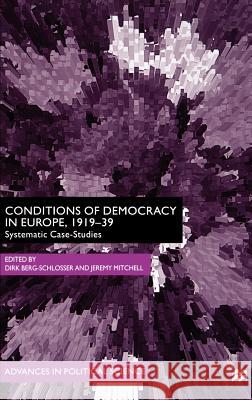Conditions of Democracy in Europe, 1919-39: Systemic Case-Studies » książka
Conditions of Democracy in Europe, 1919-39: Systemic Case-Studies
ISBN-13: 9780312228439 / Angielski / Twarda / 2000 / 503 str.
Between 1918 and 1945 there were many changes in European politics - old empires disappeared and new independent political systems emerged. Over the same period most countries faced similar problems - the world economic crisis and the rise of new ideologies and new political movements. But the political effects of these varied, and this study looks at the following key questions: why did democracy survive in some countries but not in others? How were some political institutions able to contain or manage the crises they faced but others collapsed or underwent radical transformation? This book outlines a new approach to this problem through the systematic analysis of eighteen polities within a common analytical framework. What is innovative is the weight given to economic, social and cultural factors in explaining the survival of democracy and the origins of fascism as well as the systematic incorporation of a range of political factors.











